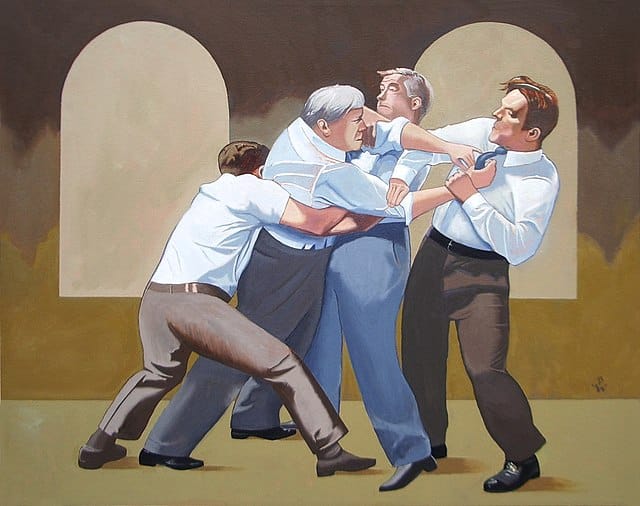“Soap” Saved My Life

by Kat Kinsman.
“These questions—and many others—will be answered on the next episode of Soap.”
For a dark-stained stretch of the calendar, from the fall of 1986 to spring of 1987, this sentence kept me from slipping all the way under. I had to know how it all ended, and I couldn't bring myself to let go before then.
I don't know how Soap first bubbled into my world, just that I had a suspicion it wasn't supposed to. I kept my mouth shut, savoring it as a solitary pleasure for as long as I could make it last. The show had ended its four-season run in 1981, but five- to nine-year-old girls weren't the sitcom's target demographic, so I'd missed it on the first go-around. For that matter, 14-year-old girls on indefinite leave from school probably weren't either, but daytime syndication breeds strange bedfellows. At the time, I was barely getting out of mine, felled by a mystery ailment that left me too depleted to do much besides pad from my room to the family room, mummify myself in an afghan and stare blankly at the TV screen.
“Mono,” the doctors agreed for a while. Fine, may I please just watch my show now? I didn't much care about why my body was shutting down, limbs and eyelids growing leaden, vision grey around the edges—just that the nothingness felt like a mercy. I was being tortured in my freshman year of high school, cleverly and deliberately, by the girl who was supposed to be my closest friend. That surely didn't help, but I also know that some brains are also built for it, that some people have to spend our energy furiously paddling where others just seem to float.
Carol: And you're Jodie?
Jodie: You sound surprised.
Carol: You're the suicidal homosexual?
Jodie: Do we have mutual friends?
Carol: Well no, no it just says, uh...
Jodie: What did you expect? That I'd be in a dress with a noose around my neck?
Carol: I guess what threw me is that you're so adorable.
Jodie: Most suicidal homosexuals are.
In 1977, Billy Crystal's portrayal of the gay, depressed Jodie Dallas was revolutionary in all sorts of ways, for better and worse. Soap was the brainchild of Susan Harris, who also created the spin-off series Benson as well as The Golden Girls, and wrote for groundbreaking shows like All in the Family and Maude. Her fanged and funny send-up of of the soap opera genre chronicled the dueling fortunes of sisters Jessica Tate and Mary Campbell and came complete with murder plots, kidnappings, alien abduction, demonic possession, and one of the first out and, if not proud at least unapologetic, characters on television to date in the form of Mary’s son Jodie. Religious groups bombarded ABC with letters of protest, and gay rights groups expressed concern over Jodie's seeming-haphazard vacillation between homosexual and transvestite and transsexual. I was unaware of any of this; I just needed him to stay alive.
“I don't know what the world is coming to anymore. When a gay man who was thinking of becoming a woman then decides on suicide turns out to be the most normal member of the family.”
Suicide was the word that pierced through the swaddled silence of our family room. No one would say it around me, likely because they wouldn't let themselves think it. No, she’s just sick. One of these tests will supply a diagnosis and she’ll be on the mend soon. The doctors will figure it out sooner or later. This was a solid thirty years before the almost irresponsibly-pretty, high school suicide-centric 13 Reasons Why was just a click away from a vulnerable young girl teetering on the edge. Having recently binge-watched it over the course of a long weekend, I'm grateful it wasn't. Soap’s 93 syndicated episodes were doled out to me 30 minutes at a time, one per weekday, and there was no fast-forwarding to the finale.
I thought about ending my life—sometimes theoretically and sometimes painfully specifically—but I was just too damned exhausted. It would take too much effort—and it might not work. Jodie survived his attempt after his closeted football star boyfriend broke up with him for fear of public exposure, and Jodie was left to contend with the stigma of mental illness and a distressed, worried family. I didn't have it in me to face the possibility of living through such a thing, so I took to existing as little as possible, hoping that if I slowed down enough, maybe at some point everything would just stop. Crawl from my bed down the stairs to the sofa, watch Soap, fall asleep, wake up, crawl back upstairs, sleep some more, repeat, repeat, repeat. The one thing that changed was what happened on screen, every weekday at 11.
Soap reruns came on early, which worked in my favor. I was expressly forbidden to watch real soap operas because my very Catholic mother found their morals questionable (which was what made them fun, and why I'd defiantly watch them alongside my grandmother on her visits), but they didn't start until later in the day. Plus the theme music was very jaunty in a way that, say, the melodramatic strains of The Young and the Restless theme were not. This was accompanied by announcer Rod Roddy's voice, rattling off a recap of the last episode and concluding the same way each time:
“In last week's episode of Soap, Jessica admitted her affair to Chester but Chester wouldn't admit his affairs to Jessica, so Jessica walked out on him. Corrine caught Peter nibbling another woman's ear and told him if she ever caught him fooling around she would kill him. Jodie, who tried to kill himself because Dennis left him, woke up alive. Confused? You won't be, after this week's episode of Soap.”
I would have greatly appreciated that clarity in my own life. A quick rundown:
“In the past year, Kat started high school, where she made the cheerleading squad. Her best-friend-slash-worst-enemy Elle, who just a few months earlier beat her up in a hotel room on their eighth grade class trip, all while telling her everything that she hated about her, failed to make the team, and in revenge decided to make Kat's life hell, and convince her that every single student at their new school found her utterly repulsive. Kat doesn't know yet that she's also clinically depressed, so she’s just stopped going to school. Her doctor is trying to rule out every cause under the sun, from mono to cancer, that might explain why Kat has suddenly stopped functioning. Now she’s about to find out she's in danger of having to repeat the whole year. Confused? So is Kat! Time for another nap.”
It was so much easier to lose myself in the cartoon melodrama and utter absurdity of the Tate and Campbell families for thirty minutes a day, and a thousand times better than being in my own bruised skin. Cheerleading rivalries and bad class trips can sound so overwrought and teen-angsty—what’s next, a bad prom date? But I couldn’t even imagine making it that far. Not even past my front door, most days.
I tried for a while. I set an alarm and everything. Bathed, combed my terrible hair, put on my regulation white blouse and navy skirt, tied my shoes and pointed myself toward the car. Some days, at the start of it, my mother would get me all the way up to the driveway of my high school before I’d collapse, hyperventilate and see stars, and beg to turn back around toward the safety of home. I stopped saying “I’ll try again tomorrow,” because I couldn’t spare the breath for the lie. But Soap was on, no matter what I did that day, if I was worthy, well, or wounded. Maybe when it was over, and the four seasons of the show had run their course I could possibly try to be a person in the world. If I could hold out that long.
Here’s the thing: Magical thinking only works for so long before it crumbles and you’re forced to face the world around you. With just a few episodes of Soap left to go, Jodie had a failed hypnotherapy session that left him convinced he was a 90-year-old Jewish man named Julius Kassendorf—and his family just rolled with it. The series ended and presumably, that’s how the reinvented Jodie Dallas tottered through the rest of his days.
Back in my suburban Kentucky home, I finished watching for the day and started the long slog back upstairs to my bedroom to sleep away the afternoon, the day, my life—and I was too exhausted to make it. I sank into the carpet at the bottom of the stairs and started to sob. I need help. I need help. I need help. And the adults in my life finally saw the actual kind of sick I was. With all physical causes ruled out, I was sent to a psychiatrist who did not attempt to turn me into anything I was not, just what I was: A teenaged girl with undiagnosed depression.
I went back to school just a few weeks after, feeling bizarrely free, lighter than I’d been in a long time. This was due in part, no doubt, to the one-two punch of mid-‘80s tricyclic antidepressants and talk therapy, but I suspect there was something else at play. While I’d been off in my own little Soap bubble, the rest of my peers bonded over other shared experiences that I’d never be a part of, and I found I didn’t really mind. I could let them have their inside jokes, crushes, styles, obsessions—I was fine in my own little world. I’d have loved to dish over Soap with someone my own age, but unless they’d been through what I had, there’s no real way they would have gotten a chance to see it. This show was mine alone. It made me feel special and kept me afloat. If I couldn’t get a full Julius Kassendorf reboot, this was the next best thing.
It made me feel brave, it made me bold, liking a grown-up thing that no one around me gave a damn about. This was bliss, not caring about anyone else’s approval of my taste, freeing myself from the burden of being palatable and hovering slightly above it. I was lonely, but so what? There was always more to watch, read, see, and be, and I didn’t have to share it with anyone else, unless I wanted to—and only if I thought they were worthy. This carried me through, and eventually far away.
I haven’t seen Soap in years, but I recently bought the full series on DVD, with the notion of plunking down and watching it with my husband. When I mentioned the show to him recently, he asked, “Oh, the one with Billy Crystal? I remember it being pretty hilarious at the time.” When we do, we’ll take our time, go at our own pace. There’s no rush to get to the end.
“In the last few decades of her life, Kat’s had her ups and downs with depression, but has managed to find a career she greatly enjoys, friends she adores, and a husband who’s with her for the good, the bad, and the binge-watching. Confused? On occasion, but she’s OK with it. She’s just glad she stuck around for the next episode.”




Comments ()